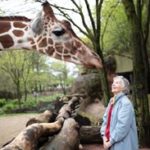By Brooke Friedman, WIFV Membership/Programming Coordinator
“Follow your dreams and fight for what you believe,” said Director Alison Reid during a February 10, 2020 phone interview. Reid’s award-winning and critically acclaimed documentary THE WOMAN WHO LOVES GIRAFFES tells the story of Dr. Anne Innis Dagg’s innovative work with giraffes in 1956, and Dagg’s subsequent fight for gender equality in the university system. The following reviews the film and references the phone interview with Dagg and Reid.
 The film opens with a segment from the game show TO TELL THE TRUTH, which features Dagg as a contestant. The concept of the show is that three contestants claim to be one person, and three judges must ask the contestants questions in order to identify the actual person. None of the judges were able to identify Dagg. This helped set the stage for one of the film’s major themes; Anne Innis Dagg made incredible strides in her field, yet she is not a household name. Reid does an excellent job of exploring this dichotomy in her 83-minute film.
The film opens with a segment from the game show TO TELL THE TRUTH, which features Dagg as a contestant. The concept of the show is that three contestants claim to be one person, and three judges must ask the contestants questions in order to identify the actual person. None of the judges were able to identify Dagg. This helped set the stage for one of the film’s major themes; Anne Innis Dagg made incredible strides in her field, yet she is not a household name. Reid does an excellent job of exploring this dichotomy in her 83-minute film.
The next parts of the film explore Dagg’s 1956 trip to South Africa and the challenges she endured as a woman in academia. Reid includes actual photographs and 16mm footage of Dagg observing giraffes in 1956. Through a series of interviews, viewers learn Dagg was denied tenure at one university and another university would not hire married women. She noticed that other qualified women were in the same situation, so she took legal action. When years of fighting did not help her case, Dagg became an activist. Reid explained during the phone interview that viewers were so upset by what happened to Dagg that they wrote letters to the university in Canada. The university issued an official apology to Dagg and created a scholarship in her name. The Dr. Anne Innis Dagg Summer Research Scholarship will be given annually to a female biology student to support her field work. Reid said that while there is a long way to go, it seems to be going in the right direction.
Dagg’s second trip to South Africa was in 2015. Reid said she shot the exact locations Dagg explored in 1956. This created strikingly beautiful transitions between the two time periods. Other interesting features of the film include interviews with practitioners inspired by Dagg’s work, interviews with Dagg reviewing her original notes from her 1956 trip, and voiceovers of Dagg’s correspondence (Actress Tatiana Maslany voices young Dagg, and Actor Victor Garber voices the South African rancher who helps Dagg).
The film encourages viewers to help save giraffes from extinction. “I don’t know if we have reached a critical mass where people’s behavior has changed,” Reid pointed out during the phone interview. She said that people are becoming more aware that giraffes are endangered and the decisions made in countries where giraffes live will be crucial in terms of the species survival in the wild.
 Reid hopes her film will inspire viewers, and she looks forward to telling more of Dagg’s stories in the future. She shares that Dagg always receives standing ovations whenever Dagg attends post-film Q&A sessions. THE WOMAN WHO LOVES GIRAFFES, a Zeitgeist Films release in association with Kino Lorber, will play at Landmark West End Cinema from February 14, 2020 – February 27, 2020.
Reid hopes her film will inspire viewers, and she looks forward to telling more of Dagg’s stories in the future. She shares that Dagg always receives standing ovations whenever Dagg attends post-film Q&A sessions. THE WOMAN WHO LOVES GIRAFFES, a Zeitgeist Films release in association with Kino Lorber, will play at Landmark West End Cinema from February 14, 2020 – February 27, 2020.
Dagg, who recently celebrated her 87th birthday in Kenya with Reid, is the author of numerous works including The Giraffe: Its Biology, Behavior, and Ecology (1976), which she co-wrote with J. Bristol Foster, Pursuing Giraffe: A 1950s Adventure (2006), and Giraffe: Biology, Behavior and Conservation (2013).
Note: Thank you so much Dr. Anne Innis Dagg, Director Alison Reid, Brian Geldin Public Relations, and Melissa Houghton for your ideas, suggestions (and/or edits), and answers to all of my questions regarding this blog post.
Photo Credits: Dr. Anne Innis Dagg, Courtesy of Zeitgeist Films; Director Alison Reid, Courtesy of Zeitgeist Films

















